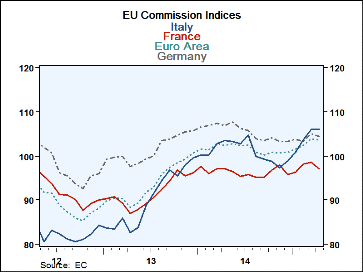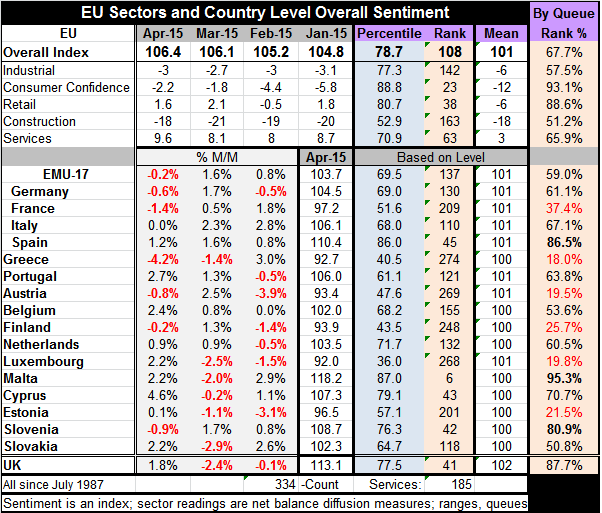 Global| Apr 29 2015
Global| Apr 29 2015European Commission Indices Show EMU Weakness
Summary
While sentiment in the EU area advanced again in April, in the EMU there was a setback. Of the 16 reporters, six showed declines in their overall sentiment indices as the overall EMU index fell by 0.2%. Eight of these member countries [...]
 While sentiment in the EU area advanced again in April, in the EMU there was a setback. Of the 16 reporters, six showed declines in their overall sentiment indices as the overall EMU index fell by 0.2%.
While sentiment in the EU area advanced again in April, in the EMU there was a setback. Of the 16 reporters, six showed declines in their overall sentiment indices as the overall EMU index fell by 0.2%.
Eight of these member countries have queue percentile standings below the 50% level (below their respective medians). Three reporters have standings in their 80th percentiles or higher; these are Malta (95.3%), Spain (86.5%), and Slovenia (80.9%). Spain is the only large economy in that group.
Looking at the sector performance for the EU as a whole, we find month-to-month declines in three of five sectors. The industrial sector fell back to -3 in April from -2.7 in March. The consumer confidence fell to -2.2 in April from -1.8 in March. Retail sales fell to an April value of 1.6 from 2.1 in March. Improving on the month was construction (to -18 from -21) and services which advanced to 9.6 in April from 8.1 in March.
The queue rankings, too, show that Europe is being led by its consumer. Consumer confidence stands in the 93.1% of its historic queue, the highest of any sector. Next in line is retailing at its 88.6 percentile. The third best ranked sector is services at its 65.9 percentile followed by the industrial sector in its 57.5 percentile. The weakest sector overall is construction which stands in its 51.2 percentile, just above its median.
The chart shows the solid upswing for Italy that has risen to a new recovery high. France's recovery seemed to end in early 2013 and from that point onward it has made very small progress. Germany, down from its recovery high, is making only slow progress over the subsequent months. Despite its setback this month, the overall EMU index has been moving up to make a new recovery high (it did so last month).
The overall EU area is still advancing. The EMU has taken a setback this month. Drops in its two largest economies, Germany and France, are mostly responsible for the setback. Still, for the overall EU indices, three are lower on balance over 12 months: industrial, retail and services. Construction and consumer confidence are net stronger over 12 months. Seven of 16 reporting EMU members still post sentiment values that are net lower over 12 months.
The EMU is still not on a clear strong track. But money supply (M3) has started to grow a bit faster in the EMU. The ECB is still doing everything it can, including extending more emergency liquidity credit to Greece. But the Greek tragedy continues to overhang markets and the euro in general. How bad is that overhang effect? More investors now expect Greece to leave the euro area over the coming year. This is according to a survey conducted by the think tank Sentix released Tuesday. The euro break-up index for Greece rose to 48.3% in April from 35.5% in March. At the same time, the Sentix euro break-up index surged to 49%. This sort of polling suggests that Greece is a factor overhanging Europe. Europe is not fully prepared for it no matter what you may read, and Greece continues to be a drag on EMU growth and outlook.

Robert Brusca
AuthorMore in Author Profile »Robert A. Brusca is Chief Economist of Fact and Opinion Economics, a consulting firm he founded in Manhattan. He has been an economist on Wall Street for over 25 years. He has visited central banking and large institutional clients in over 30 countries in his career as an economist. Mr. Brusca was a Divisional Research Chief at the Federal Reserve Bank of NY (Chief of the International Financial markets Division), a Fed Watcher at Irving Trust and Chief Economist at Nikko Securities International. He is widely quoted and appears in various media. Mr. Brusca holds an MA and Ph.D. in economics from Michigan State University and a BA in Economics from the University of Michigan. His research pursues his strong interests in non aligned policy economics as well as international economics. FAO Economics’ research targets investors to assist them in making better investment decisions in stocks, bonds and in a variety of international assets. The company does not manage money and has no conflicts in giving economic advice.
More Economy in Brief
 Global| Feb 05 2026
Global| Feb 05 2026Charts of the Week: Balanced Policy, Resilient Data and AI Narratives
by:Andrew Cates






